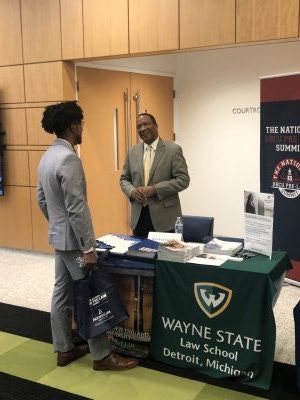ATLANTA—
Alfreda Robinson, the president of the National Bar Association, delivered a stern but urgent message to hundreds of college students from historically Black colleges and universities interested in becoming a lawyer.
“It doesn’t matter where you come from, it’s where you’re going,” said Robinson, who became president this summer of the oldest and largest national organization of African-American and minority lawyers, judges, law professors and students. “Every single one of you can become a lawyer. Every single one of you can go to law school.”
 A representative from Wayne State Law School talks to a prospective applicant.
A representative from Wayne State Law School talks to a prospective applicant.Robinson’s message comes amid ongoing concerns that law schools need to do a better job in diversifying its student population.
“Set high goals,” said Robinson, who is also the associate dean for Trial Advocacy and co-director of the Litigation and Dispute Resolution Program at The George Washington University Law School. “Apply to many law schools. Take the LSAT. Take it in time so that you can take it again. Apply early. Look for new opportunities all the time.”
Six years ago, attorney Evangeline M. Mitchell founded the National HBCU-Pre-Law Summit & Law Expo. It has become the nation’s largest gathering of HBCU undergraduate students looking to enter the legal profession.
This year’s Summit at Georgia State University College of Law provided students with a rare opportunity to hear from current law students, engage with HBCU law school deans, and find out critical information on how to finance a law school education and develop their personal essay.
“You have to apply strategy to your financial decisions,” said Teria M. Thorton, manager of Pre-Law and Education Services at AccessLex Institute, a nonprofit organization that focuses on providing access to a legal education. “You have to have a spending plan. It’s important.”
Thorton said that applicants should query law schools about the average debt of their graduates, their employment rate as well as their bar passage rate. There are additional costs before, during and after law school, she said, adding that it currently costs $1,500 just to sit for the bar exam.
 Teria M. Thornton of AccessLex Institute talks to Summit participants about financing a law school education.
Teria M. Thornton of AccessLex Institute talks to Summit participants about financing a law school education.“We have to look at this in a holistic perspective,” she said, noting that the average cost for attending a public law school is about $47,403 a year and $71,716 to attend a private law school. She told students that there are grant and scholarships that they should look for to supplement financing a costly law school education.
That came as welcomed news to Taler Anderson, 22, of Little Rock, Arkansas.
A sophomore at Talladega College in Alabama, Anderson traveled to the Summit to network and to learn more about the law school application process.
“The main theme that resonated with me is the financing part, making sure you understand it,” she said.
Since she was a young girl, Anderson said she always knew that she wanted to be a lawyer and is currently majoring in criminal justice to reach her career goal.
“It’s just something I’ve always been passionate about,” she said.
Throughout the two-day Summit, several speakers said that the rigors of law school prepared them for other careers outside of the legal profession.
“I had no desire to practice law. Why did you go? I wanted to be a college president,” Dr. Herman Felton Jr., who is president of Wiley College in Marshall, Texas, told the students. “Set limits on what you will and will not do. Manage yourself.”
Today’s lawyers, panelists said, have to be interested in more than just making a lot of money.
“It’s all about service,” said Robinson. “It’s not about you and it’s not about me. We need you to be in leadership. This is your country. We built this.”
Jamal Watson can be reached at [email protected]. You can follow him on Twitter @jamalericwatson



















